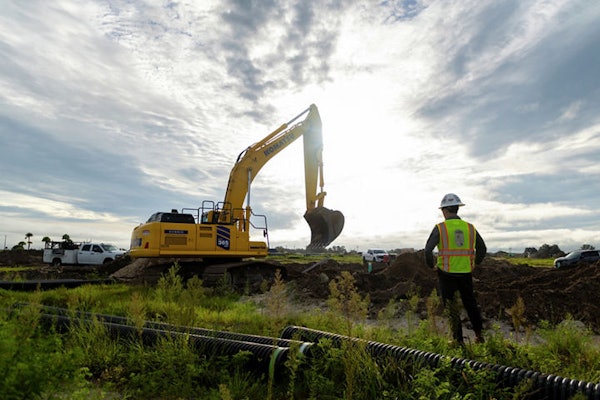The landscape around Hickory, North Carolina, is straight out of an Andy Griffith episode: rolling hills and thick forests dotted with small villages and even smaller farms. It was into this rural setting that Contractor of the Year finalist Mickey Evans had the good fortune to be born. His father, Harry, founded Evans Construction in 1968 in the foothills around Hickory, in a little crossroads village called Connelly Springs. Initially, the company focused on bricklaying and home building. And young Mickey was right there alongside his father. “I really didn’t have a choice in the matter,” Evans recalls now. “I was the only son, so I was always doing some type of work.”
The Evans family lived on a farm outside Hickory and young Mickey spent his afternoons after school on a tractor or tending to the horses and cows. In the summer, he worked with his father in the construction business, where he learned how to operate equipment. “It was pretty much me and Dad and a couple other guys here and there,” Mickey recalls. “So I was able to learn every aspect of the business first-hand, simply because there wasn’t anyone else available to do the work.”
Some people might consider a rural construction company’s growth potential to be naturally limited. But Evans thinks the company’s relative isolation actually spurred its growth. “Dad was building houses pretty regular, but because we were so far out in the country it was hard to get people to do grade work for us,” Evans recalls. “So Dad bought an old track loader, a backhoe and a grader. That’s really where the business as it exists today began.”
In short order, Mickey was running the track loader and the grader for his father. Once he’d graduated high school, Evans went to college, but admits the biggest lesson he learned there was that he didn’t want to spend his life sitting in an office. He eventually found himself back at his father’s side helping run the grading business.
“This was the 1980s, and things were tough,” Evans remembers. “The interest rates went up to like 16 percent and it was like somebody turned a spigot off. Nobody was doing anything. We went along there for a year and we just barely survived.”
All across North Carolina furniture manufacturers and textile mills closed their doors.
Evans began to think he ought to find another line of work. But he hung in there, and he and his father managed to keep the company going. “I learned a lot during those times,” he says now. “You take those lessons to heart when you’re struggling just to make payments on the equipment. And then you go off on a job and a machine breaks down and it costs you a lot of money to fix it – you just get discouraged. But I learned the importance of perseverance – I think that’s crucial for any business, but particularly construction. And I learned to make my equipment last and how to stick out the tough times until things get better.”
Mickey Evans and Richard Ingle talk over a paving job. Ingle has been with Evans Construction for 21 years.
A problem-solving business
Gradually the business climate in North Carolina leveled out. And by 1990, Harry Evans was ready to retire. Mickey took over a company that consisted of himself and one employee. His machine assets included an old track loader, a small motor grader, one small asphalt paver and a couple of dump trucks. Right off the bat, Mickey killed the company’s homebuilding division. “I always liked grading and paving better anyway,” he says. “When Dad retired, we were still doing strictly residential paving and grading. But I wanted to move it to the next level and grade streets and parking lots – those kinds of jobs.” In addition to grading and paving work, the company also tackles utility installation jobs on occasion.
Evans didn’t really have a plan other than to concentrate on delivering top-notch work and slowly expanded his equipment fleet so he could take on larger paving jobs. “Today we’ve got more than 20 pieces of major equipment,” he says. This lineup includes an asphalt paver, soil and asphalt compactors and a host of graders, backhoes and track loaders – including the old Cat 955 his father bought back in 1970.
The payroll has grown too. Evans has eight employees, including his two sons, Kyle and Kris, and wife Debbie who manages the books. “Richard Ingle started with my Dad 21 years ago, and he’s still with us today,” Evans notes. “I have very little turnover. It’s hard for me to find versatile people who work hard and are a good fit in the company. So when I do, I don’t mind keeping them on the payroll year round. I don’t like signing people in the spring and letting them go in the winter. That’s not how you build loyalty.”
When Evans took over the business his father founded, it was doing approximately $200,000 a year. Today revenues have grown in excess of $1 million. “I told my sons and my employees to understand that when they go on a job, that person is spending a large amount with us. In return, we’re always going to treat that customer’s money like it’s ours: We’re going to do that job – whatever it is – how we’d want it done if we were paying for it out of our own pockets. We’ve kind of hung with that philosophy over the years and it’s worked well for us.”
At the same time, Evans stresses keeping jobs within budget, and expects everyone to keep a handle on costs. “I think communication is a big part of that,” he explains. “You need to communicate with your customer and let them know what’s going on. There will always be problems on a jobsite because construction is a problem-solving business. If a problem arises, sit down and explain it to your customer. I’ve found if you stay on top of things, everything just seems to work out at the end of the day.”









